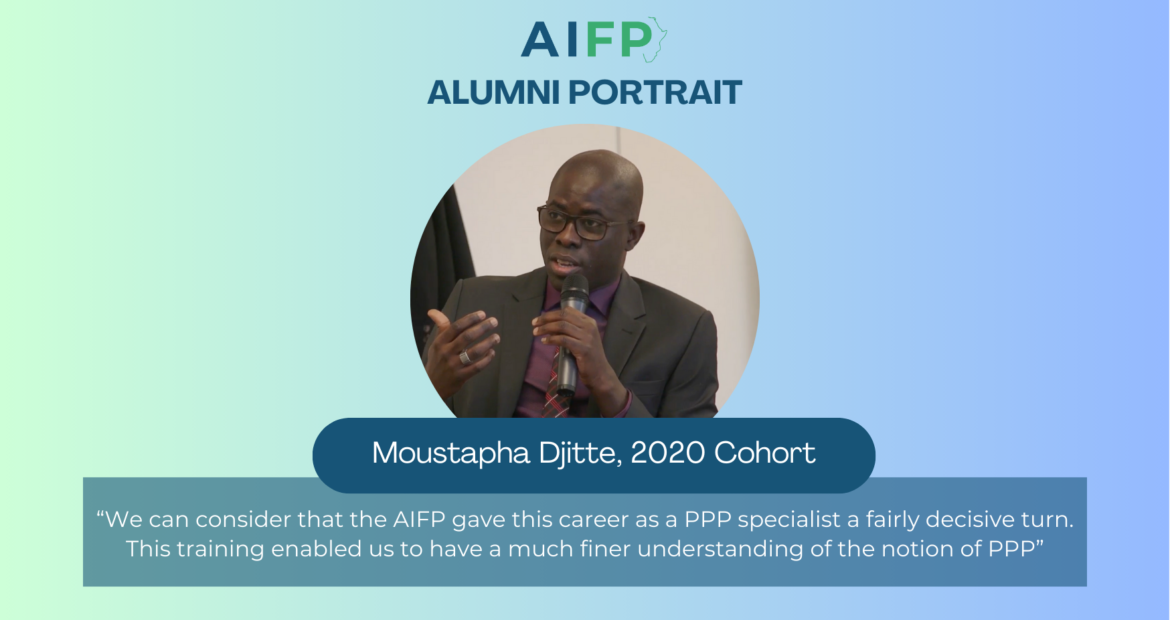What the Alumni have to say about the AIFP: throwback on Moustapha Djitte’s experience
Moustapha Djitte took part in the first edition of the AIFP in 2020! In February 2024, he published his first book, Public-private partnerships in Senegal: between the logic of public power and the logic of trade. An opportunity for the AIFP team to look back on his experience of the program, its long-term impact on the interest shown in the PPP dynamic in his country, and the notable developments there.
Trained as a lawyer, he joined the AIFP as a PPP specialist at Senegal’s Public Procurement Regulatory Authority (ARMP) and is now manager of central administration PPP projects in the National PPP Support Unit (UNAPPP). He explains in which context he decided to participate in the AIFP: “I trained as a lawyer, but after specializing in public procurement issues, I joined the Senegalese public procurement regulatory authority. […] It was in this context that I had the opportunity and privilege of joining the first cohort of the AIFP to follow a several-months training course in Paris on PPPs. When I got back, Senegal had just set up a body of experts to support the contracting authorities in setting up, negotiating and implementing public-private partnership projects. It was in this context that I was recruited as a consultant to guide the Senegalese government. […] My role today is to coordinate all these projects.”
He adds that the AIFP has been a push for his specialization in PPPs: “When I joined the AIFP, I was already a PPP specialist, but it’s true that at that time, I didn’t really have any advanced training on the subject. Thus, we can consider that the AIFP gave this career as a PPP specialist a fairly decisive turn. This training enabled us to have a much finer understanding of the notion of PPP, to understand the procedure that enables us to prepare a quality PPP project, to ensure its proper execution…” In his opinion, what helped him the most to better analyze the PPP dynamics in Senegal is the possibilities of networking the program offers. “The most rewarding moments were the meetings with the PPP players during the exchange and sharing sessions. Overall, it was very intense. […] We had courses revolving around training for the APMG certification, feedback from PPP players, meetings with financial institutions. It was a sustained training course that enabled us to cross PPPs in all directions, to meet PPP players from all over the world, and that was particularly enriching for us”, he says.
It was on the strength of this experience that Moustapha wrote his first book. A good way for him to share his knowledge with all audiences. He explains: “We’re in a field that’s still fallow, the issues aren’t always understood, therefore if we can have some depth in terms of understanding, we have a duty to share it. The aim was to make this education accessible, to enable everyone to have a good understanding of it. […] The book is of interest to everyone! For the uninitiated, it’s an opportunity to get an overview of a complex concept, with elements to help them understand these contractual categories. For professionals, it’s an opportunity to delve deeper and comprehend the doctrinal controversy that may surround these issues. I have not confined myself to an explanation of the concept. I have also tried to develop doctrinal considerations that may be of interest to everyone.”
According to Moustapha, the AIFP is an opportunity for African PPP professionals to improve the continent’s infrastructure sector: “Today, sub-Saharan African countries have no choice: to carry out large-scale projects, we have to resort to PPPs. We’ll never be able to make a success of these PPPs, in terms of structuring and formalizing contracts, if we don’t have sufficiently qualified human resources. We need to understand both the theory and the stakes of these contracts. By training African executives, the AIFP is helping to build high-quality, sustainable PPP projects. […] In any case, I can never thank enough those who launched this training program, which is now producing its effects through the projects that are being set up in our respective countries. Thank you again.”


